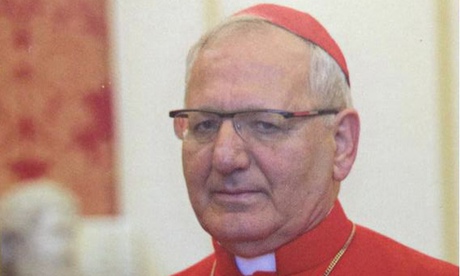Religious leaders say Isis persecution of
Iraqi Christians has become genocide
Calls for UK to give asylum to those fleeing violence
Calls for UK to give asylum to those fleeing violence
come as Syrian Kurdish fighters resisting jihadist attacks
appeal for help
Isis's persecution of Iraqi Christians, which has already forced tens of thousands of men, women and children to flee for their lives, is fast becoming a genocide, religious leaders have warned.
Archbishop Athanasius Toma Dawod of the Syriac Orthodox church said that Isis's capture of Qaraqosh, Iraq's largest Christian city, had marked a turning point for Christians in the country.
"Now we consider it genocide – ethnic cleansing," he said. "They are killing our people in the name of Allah and telling people that anyone who kills a Christian will go straight to heaven: that is their message. They have burned churches; they have burned very old books. They have damaged our crosses and statues of the Virgin Mary. They are occupying our churches and converting them into mosques."
The archbishop, who leads the Syriac Orthodox church in the UK, urged the UK government to open the country's doors to those fleeing the violence. "We are dying, 100%," he said. "The British government needs to help people and to give them asylum. If they stay here, they will be killed."
His pleas were echoed by Patriarch Louis Sako, the Iraq-based leader of the Chaldean Catholic church, who said that about 100,000 Christians had abandoned their villages in the Nineveh plains earlier this week after Isis launched mortar attacks. He asked the EU and the UN to help them before it was too late.
"They fled their villages and houses [with] nothing but … the clothes on their backs," he said in a statement to the charity Aid to the Church in Need. "[It is] an exodus, a real via crucis; Christians are walking on foot in Iraq's searing summer heat towards the Kurdish cities of Irbil, Duhok and Soulaymiyia, the sick, the elderly, infants and pregnant women among them. They are facing a human catastrophe and risk a real genocide."
Cardinal Vincent Nichols, the leader of Roman Catholics in England and Wales, described Isis's treatment of Christian, Yazidi and other communities as "a persecution of immense proportions" and urged the UK government to act.
The archbishop of Canterbury, Justin Welby, also called on the UK to follow other European governments by helping to protect Iraq's Christians and other minorities.
"It is extremely important that aid efforts are supported and that those who have been displaced are able to find safety," he said.
"I believe that, like France, the UK's doors should be open to refugees, as they have been throughout history."
However, Wilson Jaso, president of the UK Assyrian Society, was deeply pessimistic about the international community's slow response to the persecution.
"If we're not protected soon, there'll be none of us left in the country – which is our country – and no churches," he said.
"Obama has to act, as simple as that. The problem is that the Christians don't have oil. If we had oil, everyone would protect us."Urgent appeals for help also came from the leader of the Syrian Kurdish party whose fighters are resisting jihadist attacks in northern Iraq.
Saleh Mohamed, co-president of the Democratic Union party who is in London for meetings this week, said the DUP was "begging for any kind of support from anyone who can help us".
Syrian Kurdish fighters, who control the north-east of the country, have sent units across the border into neighbouring Iraq where they are supporting tens of thousands of refugees from the Yazidi minority community who have fled into the mountains near Sinjar.
The military wing of the Syrian Kurds, the Peoples Protection Units, had crossed over, Mohamed said, to help local Kurdish peshmerga fighters in Iraq who are facing Isis jihadists.
"These people want to change everything back to the way it was 1,500 years ago," he said. "We knew it was dangerous for Sinjar and the Yazidis. Isis fighters view them as unbelievers but the Kurdish regional government [in Irbil] withdrew their forces."
He said his party had warned the US and the UK six months ago that Isis was planning attacks. "No one took us seriously. [But] now the jihadists have advanced weapons and money, they can do what they want on their own."
Things had reached such a critical point that his organisation was know seeking support from anyone who was willing to step in, he said. "Without political conditions, we will accept help from anyone if they have an interest in defending freedom and humanitarian values. We have asked the Foreign Office in London for help."
Save the Children described the speed of the displacement caused by the Isis advance as unprecedented, adding that thousands of families had entered the Kurdistan region of Iraq from Qaraqosh in the last 48 hours. That exodus came days after almost 200,000 people fled Sinjar. According to the charity, 1.2 million Iraqis have been displaced in the past two months since the fighting began, placing the humanitarian relief effort under huge pressure.
"I have never known such a rapid moment of displacement," said its Iraq country director, Tina Yu. "We're seeing children and families who've fled their homes, often in the middle of the night, fearing for their lives and with nothing but the clothes on their backs.
"When they find somewhere safe to shelter they often don't have the means to buy basic necessities like food and medicine, and they don't know if their lives will ever be the same again."
